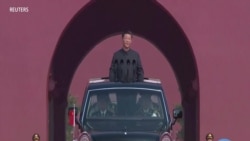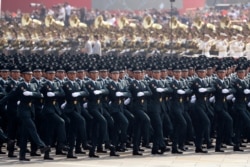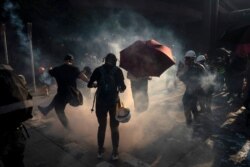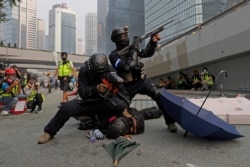As China showed off its military might in an elaborate parade marking the country's 70th anniversary under Communist Party rule Tuesday, violent clashes erupted between pro-democracy demonstrators and security forces in Hong Kong in a direct challenge to the mainland's tightening grip on the autonomous city.
Riot police fired tear gas and water cannon at umbrella-carrying protesters, who hurled homemade gasoline bombs at them and set several fires throughout the main section of the city. Video footage confirmed news reports that one protester had been shot in the chest by police firing live rounds, the first injury of its kind since the demonstrations began in June. There was no immediate comment by police.
The unrest was sparked by a proposed bill that would have allowed criminal suspects to be sent to mainland China for trial in courts controlled by the Communist Party. Although Hong Kong Chief Executive Carrie Lam later withdrew the bill, the protests have since evolved into renewed demands for Hong Kongers to choose their own leaders. They also want an independent investigation of police brutality against protesters and the unconditional release and exoneration of detainees.
Democracy movement
Protesters are angry about what they see as creeping interference by Beijing in their city's affairs despite a promise of autonomy when British rule ended in 1997.
“For many of us who treasure freedom to uphold human dignity and favor democracy, we say we feel sad for the people,” said Albert Ho, a former Hong Kong Democratic Party chairman who marched on Tuesday in central Hong Kong.
As the pro-democracy protests continue, activists have increased demands to include direct popular elections for the Hong Kong legislature, ending the current system where business elites with ties to Beijing select nearly half the legislative body.
They also are demanding an independent inquiry into possible use of excessive force by police and complete amnesty for all activists arrested.
Some protesters are asking the United States to support Hong Kong human rights and democracy efforts.
“We also welcome President Trump to consider banning all American investments in China and to ban the listing of China companies in the U.S.,” said Chapman Chen, a Hong Kong democracy supporter.
On Twitter Tuesday Trump congratulated "President Xi and the Chinese people on the 70th Anniversary of the People’s Republic of China!"
China celebration
Back in Beijing, a symbolic 70-gun salute kicked off a parade showcasing China's newest military capabilities, including a new intercontinental ballistic missile that analysts say can carry multiple nuclear warheads over several thousand kilometers.
Decked out in a gray suit in the style made famous by party leader Mao Zedong, President Xi Jinping was joined by Premier Li Keqiang and other party officials as hundreds of troops marched throughout Tiananmen Square, where Mao declared the founding of the People's Republic of China on October 1, 1949.
In a speech carried live on national television, President Xi declared that "no force" can shake the foundation of China, or stop the progress of the Chinese people.
Xi also reaffirmed both Hong Kong and Macau’s one country, two systems autonomy, but emphasized that his government will continue to fight to reunify the entire Chinese population, which includes Taiwan.
Escalating conflict
Hong Kong police have been responding to the protests with increasing force, using pepper spray, water cannon and rubber bullets to disperse protesters. Until now, there were no reports of police using lethal force, but security officials have recently been referring to protesters as terrorists and extremists.
While activists have been employing increasingly disruptive tactics, there have been reports of protesters attacking police with fuel bombs. They have also occupied shopping malls and the Hong Kong airport to increase economic pressure to compromise on the business community and Beijing.
These confrontational actions by both sides may escalate tensions and block any potential for constructive compromise.
“Radicals in Hong Kong, they can say, ‘Look, we have no choice but to fight back.’ Hardliners say, ‘Look, we have no choice. Hong Kong is slipping out of our control because of these terrorists. We have no choice but to come in and crack down,” said Richard Bush, a senior fellow and China scholar at the Brookings Institution in Washington.














